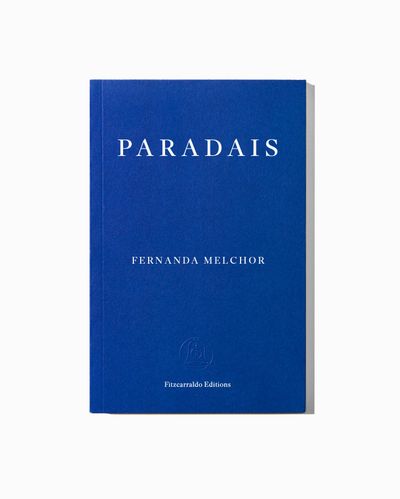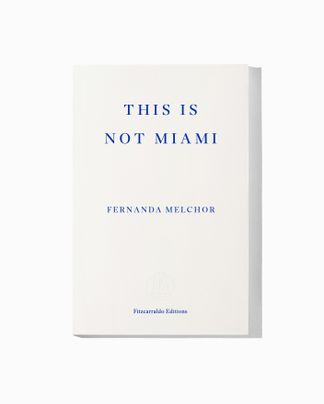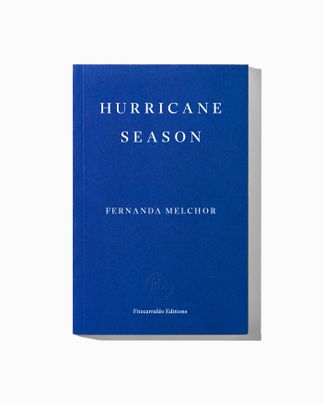Inside a luxury housing complex, two misfit teenagers sneak around and get drunk. Franco Andrade, lonely, overweight, and addicted to porn, obsessively fantasizes about seducing his neighbour – an attractive married woman and mother – while Polo dreams about quitting his gruelling job as a gardener within the gated community and fleeing his overbearing mother and their narco-controlled village. Each facing the impossibility of getting what he thinks he deserves, Franco and Polo hatch a mindless and macabre scheme. Written in a chilling torrent of prose by one of our most thrilling new writers, Paradais explores the explosive fragility of Mexican society – fractured by issues of race, class and violence – and how the myths, desires, and hardships of teenagers can tear life apart at the seams.

Paradais
Translated by Sophie Hughes
Published 23 March 2022 | French paperback with flaps, 128 pages
Longlisted for the 2022 International Booker Prize
Paradais
Translated by Sophie Hughes
It was all fatboy’s fault, that’s what he would tell them. It was all because of Franco Andrade and his obsession with Señora Marián. Polo just did what he was told, followed orders. Fatboy was completely crazy about her, and Polo had seen first-hand how for weeks the kid had talked about nothing but screwing her, making her his, whatever it took; the same shit over and over like a broken record, his eyes vacant and bloodshot from the alcohol and his fingers sticky with cheesy powder, which the fat pig only ever licked clean once he’d scoffed the whole jumbo bag of crisps. I’ll fuck her like this, he’d drawl, having clambered to his feet at the edge of the dock; I’ll fuck her like this and then I’ll flip her on all fours and I’ll bang her like this, and he’d wipe the drool from his mouth with the back of his hand and grin from ear to ear with those toothpaste ad teeth of his, big, white and straight and also clenched in rage as his gelatinous body wobbled in a crude pantomime of coitus and Polo looked away and laughed feebly and made the most of fatboy being distracted to swipe the bottle, light another cigarette and blow the smoke hard up into the air to repel the ferocious mangrove mosquitos. It was all just fatboy’s idea of a joke, just banter, drunk talk, or that’s what Polo had thought in the beginning, during their first benders down by the river, in the shadiest part of the small wooden platform that ran parallel to the water, just beyond the reach of the poolside lights and where the fig tree’s gnarled shadows kept them hidden from the development’s night watchman and residents, most crucially Franco’s grandparents who, according to Franco, would have a stroke if they caught their ‘little boy’ consuming alcoholic drinks and smoking cigarettes and God knows what other crap; and worse still, in the company of a member of ‘the service’ – as that idiot Urquiza called the development’s employees – the gardener, no less; an out and out scandal, an abuse of trust that would cost Polo his job, which didn’t really bother him anyway because he’d gladly never set foot inside that fucking development again; the problem was that sooner or later he’d have to go home to have it out with his mother, and while that was an awful – not to say downright chilling – prospect, Polo still couldn’t help himself. He could never say no to that lard-ass when he waved at him from his window; he didn’t want to put an end to their drinking sessions down on the dock no matter how much that prick did his head in, no matter how sick Polo was of his bullshit and his endless obsession with the neighbour, who fatboy had fallen for that afternoon in late May when the Maroños drove into the Paradais residential development to pick up the keys to their new home, Señora Marián herself at the wheel of their white Grand Cherokee.
Polo remembered that day well: he had chuckled to himself on seeing the husband relegated to the passenger seat when the front window rolled down with a buzz and a waft of icy air hit his sweaty face. The woman raised her sunglasses, which otherwise completely obscured her eyes and reflected Polo’s face back at him, while she explained who they were and what they were doing there, her lips painted a scandalous red and her bare arms covered in silver bangles that tinkled like wind chimes when Polo finally raised the boom barrier and she thanked him with a wave of her hand. A run-of-the-mill doña, pretty standard, he’d never seen the appeal. Identical to all the other women who lived in the development’s white villas with those fake terracotta roofs: never without their sunglasses, always fresh and glowing behind the tinted windows of their giant SUVs, their hair straightened and dyed, their nails impeccably manicured, but nothing out of this world when you got up close; Christ, nothing to lose your shit over like fatboy had. Honestly, she was nothing special. You’d probably recognize her from the photos; the husband was famous, had his own TV show, and the four of them were always in the celebrity rags: the bald short-ass of a husband in a suit and long-sleeved shirt, even in the baking heat; the two prissy kids; and her, stealing the limelight with her red lips and those sparkling eyes that seemed to smile at you in secret, somehow both playful and malevolent, her eyebrows raised in coquettish complicity, taller than her husband in her platform shoes, one hand on her hip, her shoulder-length hair loose and her neck draped in eye-catching necklaces. That was the word for her: more than pretty she was eye-catching, striking, made to be looked at somehow, with her gym-sculpted curves and her legs bare all the way up to her thighs, dressed either in raw silk skirts or pale linen shorts that set off the bronze glow of her permanently tanned skin. A passable piece of ass, let’s say, each to his own; a decent piece of ass who did a reasonable job of disguising her mileage, the wrinkles and stretchmarks from bearing her two boys – the eldest now all grown up – with creams, designer clothes and that perfectly controlled, metronomic sway of hers, whether she was in heels, sandals or barefoot on her lawn, which made half the residents in Paradais turn to watch her as she passed. Which was exactly what she wanted, right?
(…)
‘With a nimble command of the novel’s technical resources and an uncanny grasp of the irrational forces at work in society, the books navigate a reality riven by violence, race, class, and sex. And they establish Melchor, who was born in 1982, as the latest of Faulkner’s Latin American inheritors, and among the most formidable…. In Melchor’s world, there’s no resisting the violence, much less hating it. All a novelist can do, she seems to suggest, is take a long, unsparing look at the hell that we’ve made.’
— Juan Gabriel Vázquez, New Yorker
‘Fernanda Melchor explores violence and inequity in this brutal novel. She does it with dazzling technical prowess, a perfect pitch for orality, and a neurosurgeon’s precision for cruelty. Paradais is a short inexorable descent into Hell.’
— Mariana Enríquez, author of Things We Lost in the Fire
‘Fernanda Melchor has a powerful voice, and by powerful I mean unsparing, devastating, the voice of someone who writes with rage, and has the skill to pull it off.’
— Samanta Schweblin, author of Fever Dream
‘A masterpiece of concision … Paradais is a labyrinthine monologue on the banal violence of a modern-day teenager.’
— Virginie Despentes, author of Vernon Subutex
‘[Melchor’s] long, fevered sentences – which carry off daredevil moves, such as shifting tense and viewpoint from one clause to the next – combine with the emotional and physical violence of the story to produce a cacophonous effect. But time spent with her writing leaves no doubt: the unholy noise she creates is the work of someone who knows exactly which notes to hit.’
— Chris Power, Guardian
‘Whereas Hurricane Season opens with the corpse, the leaner Paradais presses towards calamity. But Melchor’s sui generis prose is equally mesmeric here. Disfigured by slang and profanity, her unruly sentences probe the boundary between the graphic and the pornographic. Like the harsh cãna Polo downs, it demands unshrinking imbibement, brooking no pause to reflect on its mechanics or to indulge uneasy doubts about whether the qualities that rivet you are purely literary ones.’
— Lola Seaton, New Statesman
‘Fernanda Melchor’s method is not to produce shocks but to make violence as endemic in her writing as it is to her experience of life in Veracruz…. Rhythm and lexis work in tandem to produce a savage lyricism. The translator Sophie Hughes marvellously matches the author in her pursuit of a new cadence…. [An] extraordinary feat of control, making [this] exceptional novel into a contemporary masterpiece.’
— Miranda France, TLS
‘A searing critique of class, one that seems to espouse a kind of determinism equidistant from Karl Marx and Juan Rulfo…. How to direct the social energies derived from social antagonisms away from crime and toward political change? Melchor offers no answers—but an accurate diagnosis of the disease is often the first step toward a cure.’
— Nicolás Medina Mora, The Nation
‘We close the book in a complex of exhaustion: aesthetic, emotional, ethical, physical. We are left with a sort of sore muscle of the soul. There are few writers who so effectively bring home the fact that language lives in the body, and that their language is our language too.’
— Lowry Pressly, Los Angeles Review of Books
‘Sentences detailing horrific abuse run on for entire pages, yet it is impossible to get lost in the long corridors of despair; Melchor’s finger is fixed on the pulse of a country engulfed by its own contradictions, unable and unwilling to look away from the violent spectacle her government would rather ignore.’
— Charlie McMackin, The Oxonian Review
‘Melchor uses shock to lay bare issues of classism, misogyny, and the ravages of child abuse. Her prose, ably translated by Hughes, is dizzying but effective; it’s as if she’s holding the reader’s head and daring them to look away from the social problems she brings to light. This might be a deeply disconcerting novel, but it’s also a brave one. A fever dream that‘s as hard to read as it is brilliant.’
— Kirkus
‘Already within the short span of two works, Melchor has made an electrifying bid for the pantheon of modern literature’s great ranters. Alongside her, you might find Elfriede Jelinek, Thomas Bernhard, and László Krasznahorkai, but still Melchor’s style is all her own … punk rock rage over Viennese decadence…. The fascination of her style, in Sophie Hughes’ stark translation, lies in this simplicity leveraged to an effect at once hypnotic and brutalizing.’
— Richard Hegelman, Astra
‘Melchor takes a risk by writing solely from the point of view of the troubled teenagers, but it’s this kind of high-stakes choice that I find exciting about her work – her honest and fearless resolve to capture the rawness of contemporary Mexican society is nothing but inspiring.’
— Terence Trouillot, Frieze
‘I find there’s something cleansing about Melchor’s work. Not because her novels may or may not be attempting to challenge toxic masculinity – I have to admit, I would probably actively avoid any novel that was attempting to be a kind of woke takedown of masculinity. It’s that she uses the full freedom that fiction can offer to say the unsayable.’
— Holly Connolly, Jacobin
‘Paradais is a torrent of piss and shit and blood and semen, but for all its visceral realism it also possesses a mythic quality. It’s all here: Elysium, the gates of Hades, and an explorer-hero whose great moment results only in him finding himself back where he started.’
— Review 31
‘In Paradais, Fernanda Melchor has written a mesmerising yet unforgiving portrait of the underbelly of contemporary Mexico.’
— Lucy Scholes, Monocle
‘Melchor has added a necessary work to the gothic genre resonant with the social fragilities of today’s Mexico, the geopolitical vulnerability it speaks to defiant of aesthetic pretensions and moralistic conclusions. Amidst the black river that flows out in the margins of the sea, the relations between characters who populate the world’s parasitic tendencies, and the cavernous fate to which the protagonists are brought, there is no redemption in this paradise lost.’
— Amancai Biraben, Associated Press
‘Fernanda Melchor has more than proven herself to be one of the most unmissable voices in translation.’
— Barry Pierce, Irish Times
‘Like her impressive and brutal debut novel Hurricane Season, Fernanda Melchor returns with another devastating examination of violence and inequality. The novel is unsparing in its critique of racism, sexism, classism, violence, and more, and while it’s set within and is speaking to contemporary Mexican society, it is arguably universal. This brilliant and raging Cassandra of a novel is meticulously translated by Sophie Hughes who again captures Melchor’s complex and propulsive style.’
— Pierce Alquist, Book Riot
‘Nevertheless, the novel is relentlessly compelling as it shifts from angry fantasy to violent reality. Sophie Hughes’s translation of such a complex and sordid story is truly impressive.’
— Patrick Graney, Literary Review
‘Melchor evokes the stories of Flannery O’Connor, or, more recently, Marlon James’s A Brief History of Seven Killings. Impressive.’
— Julian Lucas, New York Times
Born in Veracruz, Mexico, in 1982, Fernanda Melchor is widely recognized as one of the most exciting new voices of Mexican literature. Hurricane Season was shortlisted for the 2020 International Booker Prize and longlisted for the National Book Award. Paradais, her second novel to appear in English, was longlisted for the 2022 International Booker Prize.
Sophie Hughes translates Spanish and Latin American authors. She was shortlisted for the International Booker Prize in 2019 and 2020, and in 2021 she was awarded the Queen Sofía Translation Prize.





